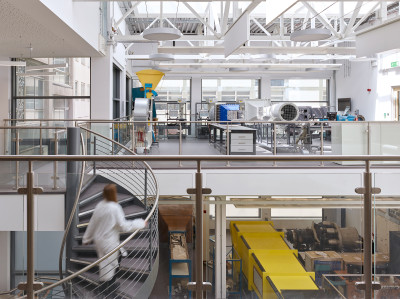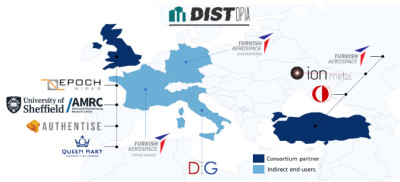News
Queen Mary joins €3 million project to revolutionise aerospace repairs with 3D printing
13 March 2024


Queen Mary researchers have embarked on a cutting-edge project to advance 3D printing technology for aerospace repairs, following €3 million of funding from Innovate UK.
The university is leading a groundbreaking collaboration called DISTOPIA (DISTorting the Aerospace Manufacturing Boundaries: OPerational Integration of Autonomy on Titanium), aimed at transforming how critical aerospace components are made and repaired.
Funded through the UK-EUREKA SMART advanced manufacturing programme, the DISTOPIA project brings together a team of international experts, including industry heavyweights such as EPOCH, AMRC (Advanced Manufacturing Research Centre), ION Metal, Turkish Aerospace, and Authentise. Together, they are working to unlock the full potential of plasma-direct energy deposition (p-DED) – an advanced 3D printing technique that promises to make manufacturing faster, more efficient, and more sustainable.
The innovative p-DED technology stands out for its ability to quickly produce strong, lightweight components with exceptional mechanical properties, making it an ideal solution for the aerospace industry. By developing this technology, the DISTOPIA project aims to overhaul existing manufacturing and repair methods, offering new ways to remanufacture and repair safety-critical parts.
While the project is initially focused on aerospace, the team believes its work will have a ripple effect across industries such as mining, chemical processing, and various engineering sectors. The potential to reduce waste and improve sustainability by repairing and reusing materials could make a huge impact on global manufacturing.
Dr Chinnapat Panwisawas, an expert in Materials and Solid Mechanics at Queen Mary, is leading the project. He highlighted the project’s focus on sustainability, saying: "Our goal is to optimise the p-DED process to ensure it works across a wide range of materials and applications. By minimising waste and remanufacturing components instead of discarding them, we’re aiming for a more environmentally friendly future in production."
The collaborative effort between Queen Mary and its industry partners is critical to making this vision a reality. EPOCH is providing expertise in wire-based materials, while the AMRC is bringing its knowledge in advanced manufacturing techniques. ION Metal, Turkish Aerospace, and Authentise will also contribute to the development of a user-friendly solution that integrates cutting-edge digital manufacturing techniques.
The project is part of the larger EUREKA network, an international platform that supports innovation through funding and cross-border collaboration. By participating in the DISTOPIA project, Queen Mary continues to position itself at the forefront of technological innovation, with the potential to reshape the future of manufacturing on a global scale.
| Contact: | Chinnapat Panwisawas |
| Email: | c.panwisawas@qmul.ac.uk |
| People: | Chinnapat PANWISAWAS |




